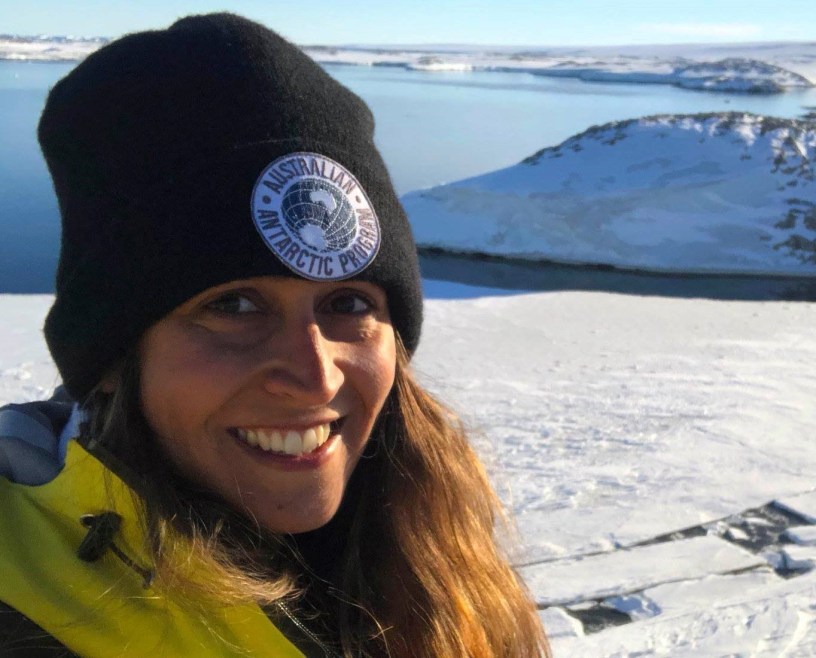When Briege Whitehead made VR documentary short The Antarctica Experience in 2018, she wanted more than for the film to be seen – the audience needed to be brought alongside her.
The result may be the next step in VR distribution, with the young WA filmmaker developing a new concept for the space after her production company was included in the latest round of enterprise funding from Screen Australia.
Called Surround Sync, the venture allows for 7.1 surround sound in more than 200 headsets at any one time and can be scaled to suit different venue sizes.
Whitehead told IF the distribution of The Antarctica Experience acted as a prototype for the idea, which had “taken on a life of its own” since.
“I wanted to make VR documentary that was really meaningful and impactful but I wasn’t really interested in making something only a handful of people would ever see,” she said.
“Looking at how VR had been working so far, what I thought was missing were synchronised mass audience experiences, where everyone gets to have a shared viewing.”
Designed to showcase the impact of climate change on the Antarctic region, The Antarctica Experience was made in partnership with the Australian Antarctic Division, DNEG, Warner Bros., Dolby, digital director Phil Harper, Screen Australia, Screenwest and Lotterywest, and the Western Australia Museum.
Working with the WA Museum, which acted as the launchpad for The Antarctica Experience, Whitehead was able to develop an early version of Surround Sync.
The documentary has since been shown major venues across Australia, including Sydney Australian Maritime Museum, and Canberra’s National Museum of Australia, and grossed more than $1 million.
Surround Sync will next be used with Beyond the Stars, a new VR film from Whitehead’s White Spark Pictures that is being supported by Screen Australia and Screenwest.
To be shown at the WA Museum, the film centres on the construction of Square Kilometre Array (SKA) telescope in Western Australia.
Whitehead admitted there were still some kinks to iron out regarding Surround Sync, which she said had the potential to be a “game-changer” for the industry.
“We have worked out a way of doing [the synchronisation] ourselves but it has been really clunky, and it’s more time consuming on us and museums for an installation,” she said.
“We’ve proved very much that it works but it wasn’t something that was easy to insert into any venue.
“Whereas now, with our Screen Australia funding, we will be able to make it far more robust and make way more headsets that are able to synchronise with it.”
Surround Sync is another highlight in the already multi-faceted career of the 29-year-old, who has experience as a writer, director, and producer.

Originally from the Wheatbelt town of Bruce Rock, she eventually moved to Perth and began working across several short and interactive dramas, as well as corporate projects for clients such as RAC and City of Perth.
In 2012, Whitehead travelled to Canada to finish her studies and work in the industry, an experience she credits with laying the seeds for The Antarctica Experience.
“I was inspired by how much more they were connected to the environment over there,” she said.
“Bringing that to people was something I knew I was passionate about as a filmmaker and I realised one of the reasons why that was the case was because it was right on their doorstep.
“I thought, ‘If Antartica was on everyone’s doorstep, it would be much easier for everyone to realise how connected the world was and how what we are doing down here impacts what is going on up there and vice versa’.”
Her desire to connect people with places led her to incorporate VR techniques into her work, and in 2017, she founded White Spark Pictures, a company focused on producing both factual programming for international television, as well as VR, immersive, and interactive productions.
The company’s recent work has included Poisonous Liaisons, a true-crime series pre-sold to C&I Network and History Channel in the UK, as well as a number of territories across Europe, the Middle East, and Africa.
Whitehead also directed the natural history series Impossible Planet, which is being marketed to broadcasters worldwide by Cineflix Rights.
Antarctica is set to remain a focus for her going forward, with White Spark in discussions for a television series about the region.
A feature documentary about The Antarctica Experience is also in the works.
Whitehead said the projects reflected her long standing ambition to “cross pollinate” VR and television audiences.
“I wanted to have something that was amazing as a VR experience, but have a television series that launches simultaneously,” she said.
“Then you have audiences on Netflix or the Discovery Channel, who will be may be thinking, ‘I really want to that location but I don’t want to walk through a cave for ten hours to get there’.
“With VR, they can go to their local cinema or museum and have more of a first-hand experience.
“Right now, I think we are on the cusp of VR going absolutely gangbusters.”


